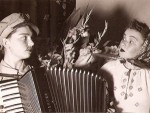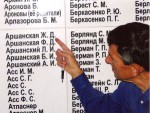Title
It is fitting that my mother’s story appear in The Juilliard Journal this month as conductor James Conlon returns to the School with his "Recovered Voices" project, for she, too, was a Jewish musician exiled and tormented by the Holocaust. It is also deeply ironic because her pianistic voice was not suppressed but rather showcased by Nazis who did not know the true identity or secret agony of the Russian wunderkind who brought them such pleasure in the midst of war.
Body
The diaspora of my mother, Zhanna Arshanskaya, and her younger sister, Frina, ended in May 1946 with their arrival in New York on the first shipload of Holocaust survivors to reach America after the war. The musical denouement came in January 1947 when they enrolled at Juilliard as full scholarship students. Later that year, Zhanna married violist David Dawson, who studied at Juilliard in the late 1920s and was a member of the Gordon String Quartet when they met.
The next year they moved to Bloomington, Ind., and spent their careers teaching and performing as members of the music faculty at Indiana University. My father was in the Berkshire String Quartet, which spent summers at Music Mountain in Connecticut. Frina married Ken Boldt, a pianist, and forged a distinguished career as a performer and administrator at the State University of New York at Buffalo. My father died in 1975, but my mother is alive and well, as is Frina.
But I have gotten way ahead of the story, which I’ve told in a just-completed manuscript titled Hiding in the Spotlight.It begins 80 years ago in a small town in southeast Ukraine, in the heart of Dimitri Arshansky, a Jewish candy maker and amateur violinist who dreamed that his daughters would be virtuosos. It was no idle dream. Using the modest profits from his business, he ordered a piano—from Germany. Of course. To Dimitri, Germany was the pinnacle of culture and musical genius, the land of Bach, Beethoven, and Brahms. During World World I, he had befriended Yiddish-speaking German soldiers occupying his hometown and found them courteous and music-loving.
Zhanna, a gifted but puckishly intractable student, began lessons at age 5 and made her public debut at 6 on the radio, forced to perform Bach’s Two-Part Invention No. 1 from memory when the lights in the studio went out, leaving her sheet music in the dark. In 1935, when Zhanna was 8 and Frina 6, Dimitri’s business failed and he moved the family to the larger city of Kharkov, where both sisters were offered scholarships at the local music conservatory. (They were told their ensemble teacher, Regina, had a brother who was a famous pianist in America, but his name—Vladimir Horowitz—meant nothing to them.)
Over the next five years the sisters’ artistry continued to mature and they grew into local legends, performing widely and winning rave reviews in the newspapers. They were offered scholarships to Moscow State Conservatory. Dimitri’s dream was coming to fruition. Then, on June 22, 1941, time stopped. Three million German soldiers and more than 3,000 tanks crossed the Soviet border.
No one in the Soviet Union—not even Stalin—could have been in a greater state of disbelief than Dimitri, who could not fathom such a betrayal by a country and people he revered. As the German army swept east across Ukraine amid reports of mass murder of Jews by killing squads called Einsatzgruppen, Dimitri’s disbelief hardened into fatal denial. Many Jewish families in Kharkov were fleeing east to Siberia, but Dimitri chose to stay, refusing to believe the horror stories.
In late December 1941, the remaining Jews of Kharkov—some 16,000 including Zhanna, Frina, their parents, and two grandparents—were marched out of town to an abandoned factory and kept for two weeks without food or water. Then came the death march to Drobitsky Yar, an area of ravines ideal for killing and burying large numbers of people. The Nazis knew this from their experience at Babi Yar, near Kiev, where they had murdered and disposed of 34,000 Jews in two days.
History says no one escaped the death march to Drobitsky Yar. Indeed, the memorial there lists Zhanna and Frina among the perished. But history spoke too soon. Dimitri bribed a guard with a gold pocket watch to turn his head so Zhanna could jump out of line and vanish into the countryside. Somehow, Frina escaped too, and the sisters found each other. Just 14 and 12, they assumed non-Jewish identities, new names—Anna and Marina Morozova—and hoped to wait out the war in an orphanage. But a visiting piano tuner heard them playing, and soon they were forced out of the shadows onto the stage where the Germans took delighted notice.
“Anna” and “Marina” spent the rest of the war as captive entertainers for the unsuspecting Nazis, performing in large concert halls for soldiers, in private dining quarters for officers and black-booted SS—fearful every moment of being discovered or betrayed. She remembers playing Chopin, Schubert, Beethoven, and Brahms for them on an upright in the cramped quarters.
“Knowing your life is up for grabs, hanging on a thread, obliterates all other systems in the brain,” Zhanna said. “The playing became very secondary, like something outside of me.”
When the war ended the sisters were sent to a displaced persons camp near Munich where, once again, an old, out-of-tune piano shaped their fate.
Along with other performers, Zhanna and Frina put on a show, a follies of sort, for the bored camp residents, all restless refugees eager to return to their homelands. Watching enchanted from the back of the hall was the camp director, a classical music lover from Virginia named Larry Dawson (David’s older brother). It became Larry’s main mission in life to bring the girls to America—a nearly impossible undertaking given the immigration quotas—but he succeeded.
Larry’s secondary mission was to have Zhanna and Frina study at a leading music conservatory. He took them by train to the Peabody Conservatory, where they auditioned for the director, Reginald Stewart (also conductor of the Baltimore Symphony), who promptly offered scholarships. The girls were surprised when Larry cut short their celebration.
“O.K.,” he said, “now we go to New York.” In Larry’s mind, Peabody was a nice backup, but Juilliard was the Holy Grail. He wheedled an audition before a jury that might have intimidated the sisters had they recognized the names: Ernest Hutcheson, Roslyn Tureck, and Muriel Kerr, who accepted both young women as students.
“When we heard she was going to be our teacher, it was a real prize,” Zhanna said. “I went to lessons with a Russian-English dictionary I bought on Fifth Avenue. Muriel and I had to flip through the pages to see what we were saying to each other.”
One day during her first year, Zhanna received a letter which made her go pale. It was from Juilliard’s president, William Schuman, asking her to see him in his office. Zhanna had been struggling to keep up in a musicology course taught in English, of course, and feared she had failed a recent exam.
“I was petrified,” she recalled. “I was shaking. I thought, ‘This is the end of my scholarship and I will have to leave New York.’ Schuman looked at me and said, ‘I want to apologize—you did not get an A. I could only give you a B-minus.’ I was in seventh heaven!”






